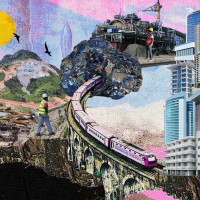Ending corporate impunity & realising the Right to Say No Digging Deeper: Conversations on Mining and Just Transitions
Explore peoples' fights against corporate impunity with Maxine Bezuidenhout (AIDC) and a Brazilian activist. They confront corporate self-regulation myths, demand state accountability, and envision transformative approaches to resources and collective power.
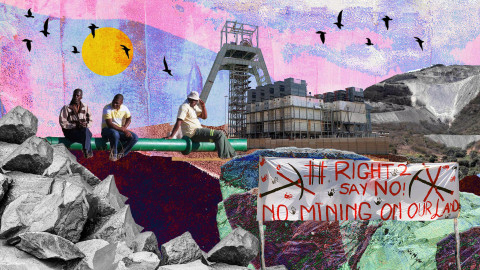
Illustration by Fourate Chahal El Rekaby
The issues with self-regulation
Katie: To start us off, can you both tell me a bit about, what is the problem with 'green mining' certifications or other kinds of self-regulation by corporations?
[Interviewee]: In Brazil, we saw in the Brumadinho and Mariana [dam disaster] cases, the certifications that make up the ‘green economy’ package don't rethink mining extraction and the impacts along the value chain.
These certifications use narratives to support the market and create social and environmental value for companies, allowing for monetization in financial markets. Because if you create certifications, you create space to negotiate your value in specific points in the financial market. By receiving Environmental, Social and Governance (ESG) certifications, you create an image of your company as sustainable, creating value for your company.
'Green mining' is proposed by the International Council on Mining and Metals (ICMM), in reaction to criticisms of environmental impacts in the sector. It frames mines as critical to supporting the energy transition, but does not critically reflect on the companies’ role in the process of exploitation, production, impacts or expropriation in communities. So through green mining certifications, companies propose new narratives around problems and create the false idea that they have solutions to these problems. You stay in this prison around the companies, in a cycle that does not allow you to think outside this economic model. It is a false solution that does not open space for democratic representation. And the social value acquired by companies supports their representation in other forums. Similar to multi-stakeholderism, when companies create spaces to discuss public agendas to construct policies and forums of representation, it allows for systems of continuous exploitation and expropriation.
Katie: Thanks a lot, that is a great start for this conversation. Maxine, do you want to come in and reflect on your experiences?
Maxine: Yes sure, I agree on this creation of a false narrative, and false solutions that stem from that. To answer this question, one has to unpack the idea of disaster capitalism. The existence of crisis and the financialization or commodification that comes from it is another means by which capital continues to operate with impunity. When companies or corporations say they have the ability to self-regulate, we need to look at the history of the world and the emergence of the first companies - in the South African context, the Dutch East India Company - and how the company operated at the time, the legacies of that corporate operation still exist today.
Over the years, decades and centuries even, corporations have always pledged themselves on their ability to do social good and they haven't done that! When they have had opportunities to contribute in terms of corporate social responsibility or social and labour plans to offset some of their operations, they don't make good on those promises that they make to affected communities. They say they are going to build a hospital, a school, and those things just don't materialize. So the ability of corporations to self-regulate, I am not convinced. History tells us a particular story, and history has a funny way of repeating itself. I don't think a corporation is an inherently benevolent thing. So when they say green mining: not going to happen..!
And we are having many conversations in our spaces around 'under what conditions should mining be allowed'? We are not saying an outright no to mining, because that would be silly. Mining is necessary for a lot of things that we now require in life, for ground-breaking medical advances, etc., but we have to be very clear on the conditions under which that is allowed. And while we are not clear on those conditions, it becomes difficult for a potentially affected community to negotiate what they are willing to give up, what they want in return.
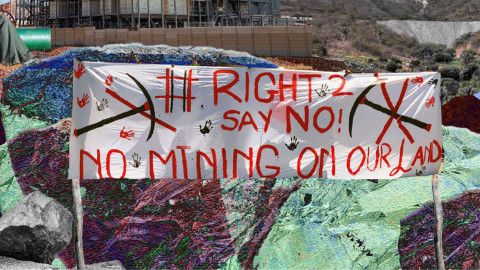
Right to Say No
Katie: You mentioned corporate impunity, about corporations having unlimited “license to operate,” and it can seem that there are few tools for communities to deal with that. Could you say a bit about the legal and political strategies that communities are using to defend their rights in the face of these very powerful corporations? And about the Right to Say No?
Maxine: So our legal frameworks in South Africa are quite good in terms of protecting the rights of particularly rural communities, where a lot of the activities of corporations take place. When the law is invoked in South Africa, we deal with questions of fundamental rights. And fundamental rights in South Africa are your rights to land. Of course we have the right to a clean environment, the right to clean drinking water, housing, education, safety of the person, etc. When we try to challenge a corporation in the courts, it is often around those questions.
Our environmental legislation is not very strong. It is good but not very strong. You have more likelihood of success if you deal with fundamental rights that are afforded to citizens. But it is a lot easier to hold a government or state accountable than it is to hold a corporation that is not based in your country. Corporations often have a ‘satellite’ situation, a corporate subsidiary in a little building you can't even call an office sometimes, from which they operate. So there are major difficulties of initiating strategic litigation against a particular company for harm caused. If it is a reparations case, this is not just about having damages acknowledged, but about getting reparations for damage caused, and this is very very challenging.
The limited resources that we have at our disposal in terms of legal expertise to take on a matter of this kind is another challenge. The way the legal fraternity is educated in South Africa is that they are pushed into commercial law. They are focusing on property transfers, and conveyancing, and those types of things, drawing up contracts for mergers and acquisitions. But when it comes to litigating on fundamental rights of persons, you often struggle to find an attorney that is skilled to be able to deal with such kind of litigation. And we have a saying: ‘the law doesn't compensate for organization and mobilization on the ground’. Because what we have experienced in South Africa is that the minute a struggle enters the legal space, it demobilizes what happens on the ground. Suddenly the community hands over their agency to these lawyers, and there is an assumption that the courts will figure it out. But that doesn't compensate for the building of people's power on the ground. When we have legal cases, it must be accompanied by a political formation on the ground level to keep and sustain that resistance.
The Right To Say No is not legislated in those words, in our legal framework. What we have allusions to are “meaningful consultations”, and courts have elaborated that meaningful consultation has the intention to gain consent from the affected community. We are currently working to draft what we are calling an ‘FPIC Bill’. We are going to push this in the South African Parliament through a 'private members bill process.' That bill would say explicitly: ‘you have the right to say no, you have the right to say yes, and you have the right to negotiate whatever those terms’. And this would be with respect to extractivism broadly but also with mega infrastructure projects, dams, roads, etc.
Katie: It is really interesting to hear about that articulated strategy between political mobilization for people to fight on the ground for rights, and a legislative strategy, recognizing that legislation can never replace mobilization.
[Interviewee]: Brazil is very close to South Africa in this discussion. In mining, we have the same process: a strong environmental legislation, but not so applicable to the context of mining. Corporate capture is very strong among mining companies. In the judicial system, actually in all the three powers in Brazil, there is corporate capture. Among social movements, we started organizing communities around mining because they don't know they have rights: rights for living, rights for food. We started this process to mobilize the people. But not specifically in these words: 'Right to Say No'. We started this because in the national legislation, the constitutional system and in many parts of the system, we are discussing participation, which is a strong idea. We say 'ok, we have participation, but do we have the possibility to say no after this participation?' Because if we talk about democratic participation, we have a right to say no.
There are important legal contributions in ILO Convention 169 [the Indigenous and Tribal Peoples’ Convention of 1989], and the right to self-determination. If you can have self-determination and this is impacting your territory, it is important to discuss the Right to Say No. In the existing formal legal system they don't accept this discussion, but it is very important to challenge that interpretation. In the last 15 years, communities also started constructing a national politics of people affected by dams. In Brazil, dams are very closely linked with mining, since the mining industry uses dams for waste disposal [e.g. creating tailings ponds].
The problem is that mining companies don't respect the legislation and they dispose of tailings behind dams. This was the case in Mariana and Brumadinho dam disasters [the 2015 Mariana dam collapse & 2019 Brumadinho dam disaster were both catastrophic failures of tailings dams used for storing mining waste. They are remembered as some of the worst environmental disasters in Brazil’s history, which dumped millions of cubic meters of toxic mining waste into local waterways and crushed local villages, killing hundreds of people]. These cases created political space to construct new policies, and we approved them last year. And now we are creating a program or regulation for this. This is the moment we are in the discussion. In the last years we were constructing the global campaign around impunity, and in Brazil now we are starting a stronger discussion.
The Global Campaign to Dismantle Corporate Power and Stop Impunity
Katie: Can you say a few words about what that global campaign is?
[Interviewee]: Of course! The Global Campaign to Dismantle Corporate Power and Stop Impunity was born in Rio de Janeiro in 2012. It is a global space to construct a people's strategy against transnational corporate power. One part of this campaign is the regulation of transnational companies and a strategy around a Binding Treaty on transnational corporations and human rights. In 2014 in Geneva, the UN Human Rights Council approved resolution 26/9 to create a working group to develop a treaty about transnational corporations. This discussion at international level started a process for discussions for national level regulations.
In Parliament in Brazil, we are now discussing a law to regulate companies and the human rights of people affected by their operations. The idea is to create a program for regulation of social and environmental impacts. The Global Campaign is supporting this through a parliamentary alliance it created to support national policies around the world.
The Campaign is a rich space to congregate different social movements and experiences around the world, connect cases and create unity: social movements, research centres and civil society organizations. So the campaign has been able to create a new process against transnational companies and put the people very strongly at the centre. I really think we have created problems for transnational companies. It contributed to the moment we live in Brazil right now, and the idea of regulating transnational companies. Mining companies are very central in this, because after two historic dam collapses, it became clear the problems that occur when their powers are not regulated. After more 8 years, we are still continuously trying to deal with the environmental and social impacts of these disasters.
We have a moment again to put the discussion of the Right to Say No on the table. But the problem is corporate capture. We also don't have imagination or ideas for a different world outside companies. Communities started to create different models of production to support a possibility outside this one. It is difficult for government and society to understand the possibilities of regulation, because of this capture of people’s imagination. I think the Global Campaign is addressing these deep questions.
Katie: By corporate capture, you mean not just the capture of legislative processes, or the penetration of corporations into government spaces, but capturing the imagination of what is possible, about what mining might look like? That's a very interesting point.
I think this story really echoes Maxine’s point, that you cannot have a legislative process isolated from building popular power. What is the kind of space you see the global campaign open up for thinking about mining differently? When we get a Binding Treaty on Transnational Corporations and Human Rights that recognizes a real right to say no, under that circumstance, what do you imagine mining might look like in the communities that you work with?
[Interviewee]: In Brazil, mining companies are under the spotlight. This is a really complex discussion: about regulation, global power, imperialism, new forms of capitalism. Connecting the global discussion to local discussions to construct strategies of resistance is really difficult, but important. The discussions we have inside the UN for the Binding Treaty are important in the process of bringing reparation to communities. We need to understand the language, business intelligence, certification processes. This creates a form for people and communities to fight against companies at local level.
In Brazil "left" processes, in social movements, we say: 'we need to know our enemy'. But it is difficult because, who is your enemy? It's a company, it's a CEO, it's the shareholders. So the movements developed a methodology to identify these and create a new strategy to fight. For example, they use 'extraterritorial obligations': you go to England to access justice, or the USA [where companies are legally headquartered]. But another possible strategy is to work with 'critical shareholders'. I've been twice to BHP shareholder assemblies, to bring the problems faced by communities. We constructed a global campaign around the Chevron case. We can also remember the Nigerian case against Shell. The Via Campesina-led Monsanto Tribunal is another case. We put these issues in the media. All this is new, we are constantly developing new strategies to respond to the new strategies of transnational companies.
The discussion on the energy transition is also new. Many governments in Latin America want to use critical minerals as part of a new 'cycle' of development. The question of lithium in Bolivia, for example. It's easy for mining companies to claim they are contributing to the energy transition with this mining. So TNI connecting the energy transition to the discussion on corporate impunity is very important. The social movements can continue linking these issues, to food sovereignty for example.
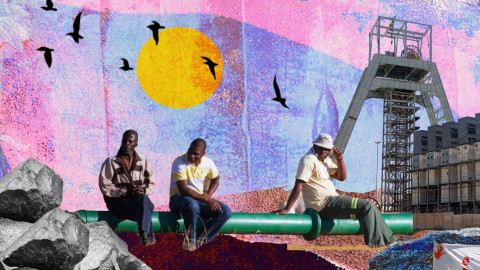
Reimagining the transition
Katie: Yes, it's very important how movements are coming together around a more comprehensive vision of a just transition that's not just a transition to "green energy".
Maxine, it would be wonderful to hear your reflections on the global campaign and what mining would look like under the conditions of a right to say no, and a binding treaty for transnational corporations. You also mentioned the question of under what conditions might communities say yes to mining, which it would be great to hear more about.
Maxine: Yes, we've been trying to figure out what does communal or community ownership of a mine look like? And it's difficult because in South African law, your rights pertain to what happens on the surface. You have surface land rights, but you don't have the rights to the minerals beneath the surface. That is owned by the state, and in our context we say, ‘whatever the state owns, the people own'. The state is a custodian of the minerals or metals, and the people are technically the true owners.
There is one case in which we are trying to argue that. This is a case of a mining right that has been applied for by an Indian mining conglomerate Jindal Steel and Power. Our objection to the granting of that mining right is based on the community’s own history. According to this history, in the 1800s, the people that lived there were ancestors of those who live there today, and used to mine this mineral that the company wants to mine. We are making the argument that some people have an aboriginal mining right, so you can't grant a mining right where one already exists.
We want to use cases like these to push the parameters of the law. And in cases like that, where more than 200 years ago, people have been mining iron to make spears or cooking equipment, using their own smelters and things like that, we are arguing that those were communally owned natural resources that were distributed in a particular way based on needs.
And the needs were that the tribe had to defend its territory when it was under attack, and had to find iron because they couldn't afford to buy weapons and had to use what the natural environment provided them. Because when we talk about communal ownership these days, it's “who does the books, who's going to do the finances? What is the structure? Who makes decisions about who gets to use the mineral today, and who gets to use it tomorrow? Who gets to sell their share off to somebody else?” It becomes very complicated. A lot of the work is about undoing the individualism that has been imprinted in us because of this capitalist system. It tells you: you are the problem, you did something wrong, you need to work harder, you are not doing enough. So everything becomes individualized.
Katie : And technical, depoliticized as well, right?
Maxine: Yes, and so a lot of the political work is undoing that individualism, the selfishness, the wanting to go behind somebody's back because you can get a better deal. And if we are trying to change that system, we have to change how we see ourselves. And if we can only see ourselves within the system, what does our existence look outside of it? Collectively? We have this saying, an African proverb about Ubuntu: I am a person because of other people. We need to go back to that, if we are talking about a full systems overhaul.
We need to be able to have these types of conversations, where a three-year-old child is not asked 'what do they want to be when they grow up'? Where your entire socialization is around your labour, and what labour you are going to produce for the system. But it's asking them: what do you want to contribute to the society? And whether it is weaving baskets and making mats, that's it! Because everything has been put into these different boxes, and if the box doesn't fit, then it's your fault. The reason you are poor is your fault.
Challenging this is a big part of creating and sustaining alternatives. We can only do that once we've started to unlearn some of this thinking that has been ingrained in us for generations. And when we are trying to deal with a corporate giant, even a tool like the Binding Treaty is a tool which not just a people of a specific territory can be empowered by. It is also to protect the interests of the state, saying to corporations: ‘look, the state is not another one of your tools in your toolbox anymore’. The state is taking it's power back.
That's been a very helpful narrative in the South African context. It has helped us build good relationships with our department of international relations and cooperation. This is about how we protect the state's interests, so that it doesn't get exploited by an unregulated entity that can shapeshift at the drop of a hat. This is not just about the people, this is about: our country could get sued to the value of it's entire GDP, and then what do we do? And this could have been avoided through some of these mechanisms of accountability.
Katie: Think this point about the need to reimagine and to move away from individualism is a critical one, because you sometimes hear a framing of the Right to Say No, or even of FPIC that can sound very individualistic. It can sound like it's about the rights of these specific people to say no to those specific people. But it's much more about re-envisioning the whole system, and fundamentally thinking about the role corporations have in it.
[Interviewee]: We've really practiced these forms of organizing life outside the capitalist system, including the state. Because the state is a historic process, taking up different forms in different moments.
When I started this work on mining companies in Brazil, 8 years ago, it was really a new process. But the companies are the same as those in the colonial system. The mining companies are connected to slavery and the patriarchal system in Brazil. So in the communities, as part of Movement of People Affected by Dams (MAB), we practice different forms of organizing relations, through collective decision-making processes. Because it's difficult to make a collective decision. It is difficult to create a Right to Say No in communities. It is really difficult, because some people in the communities support mining companies. So to start this discussion is to open the mind to different possibilities, where the state could support people, not arrest people. This is especially important because of cases of racist policing in Brazil.
I love what Maxine said. We are not prepared to support society, or live in society. We are prepared to live alone, and develop as individuals, not in a collective. So we need to remember this and think outside the box. It's important to develop new values around reciprocity, solidarity, sovereignty, food sovereignty, and 'needs to life', needs to environment. We need to create these new values, in this fight against transnational companies.
And we, social movements in Brazil have a challenge to construct another political project for our state. I work with the government but it is really clear that the Lula government doesn’t have a project for the people, because we are not organized to this level at the moment. And we are up against a power that is really organized and has strong ideas. So these campaigns and international-level organizations are important to construct a new power. We had a few moments in the 70’s and 80’s, with the Salvador Allende in government and others. We had a project to construct collective power as the so-called “third world”. We need to construct this again at the different levels.
Final thoughts
Katie: You have both put huge ideas on the table, this has been a very inspiring interview. Do you have any final thoughts that you think are important to bring in this discussion?
Maxine: One of the things I wanted to mention is the whole question of 'just energy transition' and how this has become the buzz word. A lot of decisions happen very paternalistically, as a consequence of a patriarchal system. There is an adult, usually a male adult, that makes decisions on behalf of others, without necessarily a mandate. The just transition processes have happened in a similar fashion. When we talk about the ILO Convention 169, the right to self-determination, at what point are people allowed to come together and convene on their own terms, within their own timelines and their own means of coming to consensus, deciding what type of development path they want to follow? And the scope and the scale of such development? We don't allow these natural processes to unfold, because capitalism is on a timeline. Time is money.
People need to have a chance to discuss, to deliberate, to have a meal over the discussion, to revisit back in two weeks' time. There is a natural process that needs to follow in order to take people along. But the order of the day is that somebody comes in, and tells you: ‘ok, on this hectare of land here, we will have a school. Opposite the school we will have a transport facility, trains.’ And maybe the people of that place do not need that. We are trying to reinforce the idea that the Right to Say No is a collective right. And outside of the collective, it doesn't exist.
We usually have a joke, if somebody doesn't want to do something, they'll say: I have the Right to Say No', and we'll come back and say: 'the right to say no is a collective right' - are you a collective? and then we have a laugh about it. We remind ourselves constantly that 'this is a collective process'. This is not the right to the safety of a person. This is not a right that stems from individuality. It's a collective ask, a collective demand that communities have. That, in and of itself, is a pushback against the way corporations function. They don't want to talk to a collective. They want to talk to one individual that they handpicked from a community and say, 'ok, we are going to offer you this, but don't tell the others'. It feeds into the divide and rule tactics.
We need to be aware of the way in which the enemy functions. So the questions: if it's a road, a bridge, somebody needs to be relocated off the land, how is the collective being impacted by those things? That's been the premise under which we are trying to shape what a 'just transition from below' looks like. It's a collective process.
Funders don't always like things that don't have clear timelines. We are talking about re-imagining, refocusing, reprogramming the way in which we have been told to show up in the world. That's what will help us to shape a truly just transition from below. Not just because the Global North said we can't use fossil fuels anymore, and the rest of us have to hand over our minerals so that the Global North can transition.
We are trying to address some of those things. And that takes people along, in an inclusionary and collectively owned process. Rather than another paternalistic process where somebody zooms in from above, thinking they have the authority and a mandate to say ‘this is what we are going to do, come hell or high water’.
Katie: Really important points. I also see a link to what you said earlier about disaster capitalism: there are important lessons for climate movements, especially for climate movements in the Global North, who, from a space of very good intention can still get trapped in this narrative of emergency. Of course the climate crisis is an urgent situation, but if you focus on that to the point where you can't let these other deeper, organic processes of genuine transformation unfold, we set ourselves up to move from crisis to crisis, instead of addressing underlying causes.
Maxine: 100%. That was said so lovely. But it's difficult because, the rise of the right-wing fascist, populist politics thrives on centring a particular crisis, in sort of a tunnel vision, like blinders on a horse. You can't see anything outside of that, and the picture continues to be painted for us. What I’m saying is that everybody gets a paintbrush, everyone gets to choose their own colour. If you want to change colours and you want to mix this colour with that one's, let's do it. Let's see what picture emerges from that because the current picture that we have doesn't work. If you're going to continue replicating the same things, we are not going to get to the real utopias, you know?
Digging Deeper
Full dossierConversations on Mining and Just Transitions
This series of conversations is aiming to explore challenging questions around mining and the energy transition, and the solutions that social movements are putting forward.
-
Digging Deeper An Introduction
Publication date: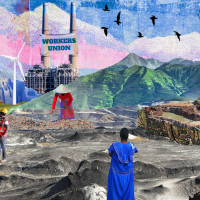
-
Ending corporate impunity & realising the Right to Say No Digging Deeper: Conversations on Mining and Just Transitions
Publication date: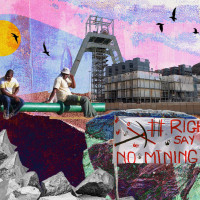
-
Artisanal and Informal Mining Digging Deeper: Conversations on Mining and Just Transitions
Publication date: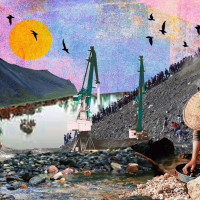
-
Mining, Land and Territories Digging Deeper: Conversations on Mining and Just Transitions
Publication date: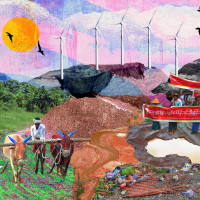
-
Right to Repair and Circular Economy Digging Deeper: Conversations on Mining and Just Transitions
Publication date: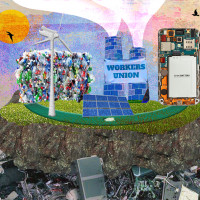
-
Green Industrial Policy Digging Deeper: Conversations on Mining and Just Transitions
Publication date: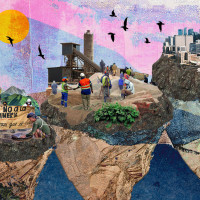
-
Climate finance & Climate reparations Digging Deeper: Conversations on Mining and Just Transitions
Publication date: